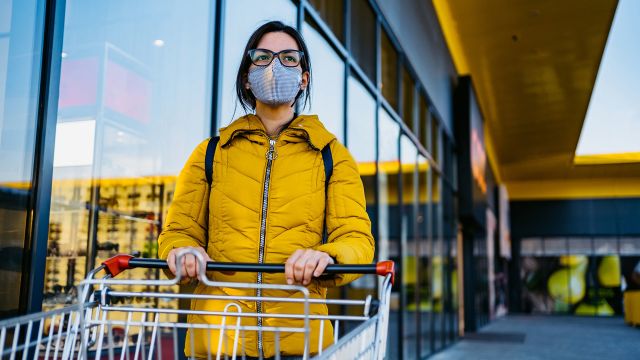Updated on April 8, 2020.
Americans are being advised to stay home due to COVID-19, but what if you need to go food shopping or pick up a prescription at the drug store? What precautions should you take to steer clear of illness while buying essential items?
These common-sense strategies can help you reduce your risk of becoming infected when you absolutely must shop.
Order online if you can
COVID-19 is spread in large part from person to person through the air or via direct contact. Ordering items online for delivery greatly minimizes your interaction with others. Try a service such as FreshDirect or Amazon Fresh. They may be more costly than your regular supermarket, and access is limited in certain areas, but shopping is typically a simple process. Numerous supermarket chains and local grocery stores offer delivery, too.
Before you start shopping, understand that delivery slots for many services are filling up quickly. And if you do find a slot, it could take several days to receive your groceries. Try to anticipate what you might need a few weeks ahead of time prior to placing your order.
When delivery time rolls around, ask that bags be left on your doorstep. Tip online to further reduce your risk of exposure to COVID-19.
A second-best alternative to delivery is curbside pickup, which many grocery chains and other retailers also offer. You order online just as you would for delivery, then pull up to the supermarket parking lot to grab your pre-packed bags, or have them loaded directly in your car by a store employee.
Time your shopping trips
If you venture out to the market or pharmacy, go alone—with no other family members—and avoid visiting during prime times. The easiest way to find out what times are least crowded is to Google the store and its location; for many establishments, a box will appear detailing visitor volume by the hour. A quick phone call to customer service may do the trick, as well.
Since adults aged 65 and up are considered to be at higher risk for more severe illness, many supermarkets now have shopping hours set aside for seniors. These hours can often be found on the store’s website and are usually early in the morning.
Before you go, write up a grocery list so you don’t forget important items that would require a second trip. And remember: Only purchase what you need, so others can do the same.
Follow mask recommendations
Americans are advised to wear non-medical cloth coverings, such as masks or bandanas, over their noses and mouths when they go out in public settings where social distancing is difficult—like supermarkets and pharmacies. (Medical masks should be reserved for healthcare professionals.) If you're sick but don't have any symptoms, masks may help slow the spread of the virus to others.
Many people choose to wear nitrile or latex gloves when they shop, but remember: Gloves can carry the virus the same way your hands do. So, make sure you don’t touch your face with gloves on, and dispose of them when you’re finished shopping. Once the gloves are off, you should still wash your hands with soap and water for at least 20 seconds or rub them with sanitizer containing a minimum of 60 percent alcohol.
Since the COVID-19 situation can change rapidly, the best way to stay on top of new safety recommendations is to follow coverage from credible sources, such as the Centers for Disease Control and Prevention or the World Health Organization.
Take precautions at the store
Though supermarket and drugstore employees across the nation are doing their best to keep facilities clean, you should still take certain steps to protect yourself when you shop.
- Wipe down cart handles. If you touch a surface contaminated with the novel coronavirus and then touch your eyes, nose or mouth, you may become infected, even if you wear gloves. So, before you grab a shopping cart, clean its handle using disinfectant wipes. Some stores provide these wipes, but it’s a good idea to bring your own just in case.
- Stand back. Remember to stay at least 6 feet from others at all times. Some stores are using tape or other markers to illustrate the correct spacing.
- Bag your own groceries when possible. This cuts down on the number of people handling your items.
- Pay with a card or app. Using a credit or debit card eliminates the handling of cash and coins. Carry and use your own pen to sign receipts. Even better: Virtual payment apps like Apple Pay or Venmo mean that the only thing you must touch is your phone (which you should also disinfect regularly).
Remember to wash or sanitize your hands once you’re finished shopping—especially after touching credit card machines and self-checkout kiosks. Some stores may have sanitizer available, but you may want to carry some from home.
Wash up at home
Research published in The New England Journal of Medicine in March 2020 suggests that the novel coronavirus can survive on cardboard for up to 24 hours and on plastic for up to three days. If you are concerned, take special care with bags and boxes coming from outside your home.
Make sure to wash your hands before and after you unpack and avoid touching your face during the process. If you place a package on a countertop, wipe the surface down thoroughly with an alcohol-based wipe or disinfectant once you are done unpacking.
Throw away or recycle all disposable plastic bags and wipe down reusable plastic bags with disinfectants. Eco-friendly nylon and cotton bags can be machine-washed in the warmest water tolerable for the fabric, and then air-dried. If you’re worried about contamination, you can use disinfectant wipes on solid, nonabsorbent containers like glass or cans.
Since evidence does not suggest that COVID-19 can be spread through food packaging, you do not need to disinfect every food item you bring into your home. It makes sense to wash all fruits and vegetables as you usually do before you eat them with cold, running water to remove dirt.
Consider wearing gloves to pump gas
Filling up your tank is an essential errand, especially for store trips or for people who are still going to work on a regular basis. You may want to wear disposable gloves or use a paper towel when using the pump handle. Make sure to dispose of the gloves or paper towels after you finish pumping. Apply hand sanitizer when you are done, before you get back into your car.
Ultimately, taking precautions when shopping for essential items during the pandemic is critical. But remember: The best ways to protect yourself from COVID-19 are still to stay home as much as possible, wash your hands regularly and avoid touching your face.







